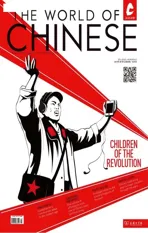Arise, Comrades!
2014-04-05
Arise, Comrades!
Fuel yourselves with revolutionary spirit and drive the glorious proletariat toward a brighter future against the imperialist Western dogs! Or, ya know, don't; it's up to you really. Either way,TWOChas done its level best to bring you a Red China issue—from revolutionary intellectuals to villages living in the age of Mao. China's relationship with communism is beyond complex, with the competing ideology of market capitalism and its success in driving the country's modern reform miracle. However, the dream of a socialist paradise is alive and well at the heart of modern China.
They're the soul of the Party's ideology and a thorn in its side; today's Chinese left is a potent force in contemporary Chinese politics. They see themselves as a reminder of the past and the hope for China's future, but they're also often seen as a menace to the modern mass line. “China's New Left”(see page 28) takes a look at how this dwindling group—obsessed with “historical nihilism” and wary of a market-oriented Middle Kingdom—hopes to change the course of the country.
“Confession Controversy” (see page 36) studies the mores and importance of confessions from the Cultural Revolution. As one of the most turbulent times in China's history, conversations about the sins and regrets of the period yo-yo between trendy and shameful. The era itself is cloaked in humiliation and pain, and the issue is mired in political sensitivity; those who choose to get on the agonizing road of the Cultural Revolution confession face fi re on all fronts.
Deep in Henan Province there lies a city stuck in time. Ornate portraits of Marx, Lenin, and Stalin dot the landscape, and slogans urging continual revolution are emblazoned on buildings, tenements built for the sole purpose of boasting the power of China's socialist system. Today, tourists visit this modern Maoist Mecca for a taste of the past, but “Maoist Vacation” (see page 42) shows that this getaway isn't as immune to the tribulations of the market Middle Kingdom as one might be led to believe.
In “Martyrs' Anthem” (see page 48) James Palmer gazes back through the decades of New China to study the history of “March of the Volunteers”, China's national anthem. This well-known nationalist song has a past of success and pain that, in many ways, mirrors China's own battles; on the way to creating the nation's iconic song the creators suffered as China suffered. They rose quickly and fell hard, casualties of China's march.
If you're still in the mood for the revolutionary spirit, you can always check out our “On the Character” (see page 92), which delves deep into the character 革. Or, if art's your thing, head on over to “Gallery” (see page 58) to learn how “We Have Betrayed the Revolution”. However, if you're sick of all this proletarian piff l e, read about how the other half lives in our new section “Group Think” (see page 70), which looks at the golden world of thetuhaoin all their vulgar glory. If your tastes are even more bourgeois—hedging on the literary—check out “Pioneer”(see page 88) which hosts an interview with China's short story master Jiang Yitan, or try our new section “Bookmark” (see page86) for a study of the famousFortress Besieged. It's a new year, and you may notice some changes around these parts: new columns, new writers, and new ideas. But, we're still the same oldTWOC, and we wish you and yours a happy New Year.
Managing Editor
Tyler Roney
